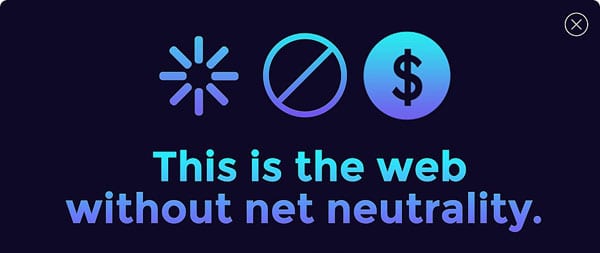
March 6, 2019; TechCrunch, VICE “Motherboard,” and Deadline Hollywood
Sometimes, a simple, straightforward move is best. On Wednesday morning, the Democrats in the US House and Senate released a legislative proposal that, in three pages, would reverse two years of Republican-driven FCC shenanigans regarding the free and open, net-neutral Internet.
The Save the Internet Act of 2019 seeks to “restore the open internet order of the Federal Communications Commission.” The crucial text comes in a succinct package:
The Declaratory Ruling, Report and Order, and Order in the matter of restoring internet freedom that was adopted by the Commission on December 14, 2017 (FCC 17–166) shall have no force or effect.
The Declaratory Ruling, Report and Order, and Order described in paragraph (1) may not be reissued in substantially the same form.
The following are restored as in effect on January 19, 2017:
(1) The Report and Order on Remand, Declaratory Ruling, and Order in the matter of protecting and promoting the open internet that was adopted by the Commission on February 26, 2015 (FCC 15–1924). (2) Part 8 of title 47, Code of Federal Regulations. (3) Any other rule of the Commission that was amended or repealed by the Declaratory Ruling, Report and Order, and Order described in subsection 2 (a)(1).
This bill caused the usual bursts of elation or disdain from those invested in the cause. The House Committee on Energy and Commerce collected a number of statements from advocacy groups, many of them nonprofit, including this one from Rashad Robinson, president of Color of Change:
Sign up for our free newsletters
Subscribe to NPQ's newsletters to have our top stories delivered directly to your inbox.
By signing up, you agree to our privacy policy and terms of use, and to receive messages from NPQ and our partners.
Restoring strong net neutrality protections is vital for Black communities and all communities of color, who depend on an open and free Internet to succeed in educational and business pursuits, express joy and creativity, organize for political power, and fight injustice—without fear of censorship by an ISP. Our communities require the full potential of the internet to thrive in the 21st century; net neutrality is how we move Black voices and issues into the mainstream without needing the approval of gatekeepers. We applaud Democratic leadership for introducing this legislation and taking an important step toward ensuring our communities’ civil rights are recognized and protected in the digital sphere.
Democratic stalwarts also spoke out in favor of the bill. Speaker Nancy Pelosi said, “The free and open Internet is a pillar of our democracy. It is an honor to join Democrats from both sides of the Capitol to introduce this strong legislation, which honors the will of the millions of Americans speaking out to demand an end to the Trump assault on net neutrality.” And Senate Democratic Leader Chuck Schumer said, “When the Republican-led FCC repealed net neutrality rules, they handed the big internet service providers the car keys and left American families and small businesses standing on the sidewalk. Special interests and the biggest corporations shouldn’t get to decide how consumers access the internet.”
Meanwhile, the Republican stance is that the fight for net neutrality was so much doomsaying, and that since the protections put in place were removed, more high-speed fiber had been laid than in years prior and that hardly anyone noticed a difference. (The Santa Clara fire department sees it another way.)
If this bill were to pass, it’d be an improvement. However, as Devin Colewey, writing for TechCrunch, points out, it’s not the long-term solution the problem needs.
What it doesn’t do is address the issue at the heart of the problem: that the laws governing the FCC and defining internet communication for the purposes of regulation are quite out of date. It is the ambiguity in critical portions of the Communications Act (and its major 1996 overhaul) that enable the FCC to pick and choose which industries it regulates.
The FCC’s argument, at the center of the 2017 rule, that broadband isn’t telecommunications is supported by almost no experts whatsoever, yet as an expert agency it can decide such technical matters on its own. If Congress were to establish a law clarifying that, however, it would remove the Commission’s freedom in this matter and constrict it to operating as the law dictates.
Still, it’s a first step, and one worth rooting for.—Jason Schneiderman












